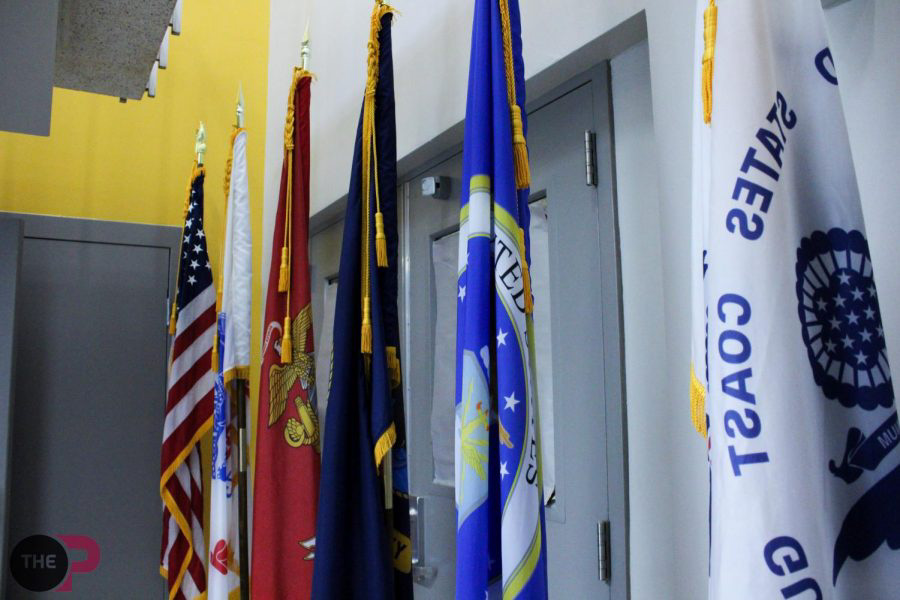Effects of COVID-19 pandemic weigh heavy on student veteran population
Oakland’s student veterans will continue education through the benefits of the G.I. Bill.
“[It’s been] busy … trying to get all this online stuff going,” Mason Turrell said with a calm tone as he aims to continue his semester through online learning. “Trying to figure it all out and make sure I got everything that I need in order to be successful, and just taking it one day at a time.”
Turrell is one of thousands of Oakland University students affected by the COVID-19 pandemic, which has forced OU to switch to an all-online learning format after canceling in-person classes.
Last week, an email from the Office of the Registrar stated that summer 1 classes have been moved online and will be held remotely “potentially through August.” Although the suspension of in-person classes took effect Wednesday, March 11, it wasn’t until the stay-at-home order issued by Gov. Gretchen Whitmer on Monday, March 23 that the school was forced to close down many of its buildings and facilities, leaving many student organizations closed for the semester.
For Turrell, the effects of the ongoing pandemic on his education and life are only beginning.
Turrell graduated from OU with a criminal justice degree a few years ago, but he has since reenrolled and is working on his graphic design degree.
After enrolling at OU again, he began working with Veterans Support Services, and his passion for the student veteran population led him to become the new president of Student Veterans of Oakland University (SVOU). Since taking over the position, Turrell has made helping student veterans a priority, as well as serving the larger OU community.
However, with the recent closing of campus buildings, Turrell has had to close the SVOU office as well. Like other student organizations, SVOU has had to cancel all of its programs and activities.
“We knew it was coming, it was just a matter of time,” Turrell said.
Since closing the SVOU offices, Turrell had to cancel many events SVOU planned for months ahead, such as its April 1 Top-Golf event, in which some employers were invited out to the facility to interact with student veterans one-on-one.
“I’ve even had to cancel with one company that I was exclusively having them come out to the Veterans Support Services offices and giving them exclusivity to just have one-on-one interaction with students,” Turrell said.
With summer coming up and the uncertainty of campus reopening for any student activities, SVOU has had to reevaluate its future events. Turrell has already begun planning SVOU’s annual 9/11 Road March, but has questioned whether it will even happen.
“I’m still going to move forward with our board as if we are actually going to do the event, that way we’re prepared,” Turrell said, “but I’m also going to have that plan B in place in case we’re not doing it or need to postpone it.”
But the cancellation of student org activities and events is one of the least concerning matters for the student veteran population.
“For myself and other students that work there, we’re out of a job for the time being, unfortunately,” Turrell said. “My big worry, as I told my wife last night, is the people that don’t have a disability income — how are they going to be affected by this, because they could potentially lose their houses, their apartments, vehicles, they could lose their livelihoods.”
Close to 10 million people have filed for unemployment nationwide in the last three weeks, with more than 300,000 Michigan residents filing for the claims, according to Bridge Magazine. That’s roughly one in 10 workers in the state, a total of 439,092 in the last two weeks.
“That means that if we don’t have a disability rating and that disability income from the VA [Department of Veterans Affairs], that means that we no longer have an income,” Turrell said. “This is affecting people because if you don’t have that disability income and you worked on campus, you’re [shit outta luck]. You’re out of a job, you’ve got no income, how are you going to pay your bills?”
However, the national chapter of Student Veterans of America has been working with Congress to find solutions to make sure that there is as much minimal impact as possible for all the student veterans in the country. On Saturday, March 21, President Donald Trump signed bill “S.3503,” which essentially allows student veterans to continue their education through the benefits of the GI Bill without any penalty or changes that could disrupt it.
“If you’re taking in-person classes, you get a higher amount,” Turrell said. “But if you’re strictly taking online classes, all online classes, you get half the national average for that housing stipend.”
For Turrell and other members of SVOU, this means that every student veteran will still get paid the appropriate housing stipend regardless of OU switching to all online classes. Many student veterans rely on that housing stipend to pay their mortgage, rent, and other needs and necessities.
“We are actually expecting, at OU, enrollment to go up in our veteran population now that people are out of a job, so that’s something else we’re preparing for,” Turrell said.
In the meantime, during the lockdown, Turrell will keep his student veteran members updated on all school-related matters regarding the university’s handling of the pandemic and working on his online classes.










